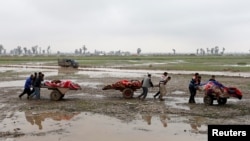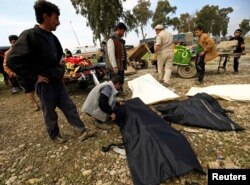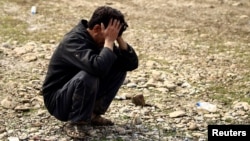Shihab Ayed and several other men struggled to push a cart carrying the bodies of his son and wife, wrapped in blankets, through a muddy ditch nearly 2 miles (3 kilometers) from their destroyed home in Mosul.
Four other carts followed, laden with days-old corpses from air strikes that the men said killed 21 relatives and neighbors in an area Islamic State militants controlled earlier in the week.
A father's loss
Ayed, a 40-year-old laborer, pulled back a blanket to show his only son, 3-year-old Ahmed, lying lifeless with his eyes closed and a big gash in his right cheek.
“Three houses were destroyed by two air strikes,” Ayed said. “Islamic State fighters were firing from our house and from the road outside, and we were hiding inside. Fifteen minutes later the strikes hit.
“We pulled the bodies from the rubble and now we’re going to bury them. Then I’ll come back to my three remaining daughters,” Ayed said, in tears.
The bodies had begun to smell, but it had only just become safe enough to leave the district, now cleared of the militants, and bring the carts to Mosul airport, where a bus might be able to take them to the nearest village for burial, he said. Reuters counted about 15 corpses on the carts.
Air strikes miss IS, kill civilians
They are among the latest victims caught in the crossfire of an intensifying battle between U.S.-backed Iraqi forces and Islamic State militants holed up the center of Mosul, their last major stronghold in Iraq.
Rights groups have expressed concern over the mounting civilian death toll, as Islamic State fights from homes and densely populated areas, a threat the Iraqi military and U.S.-led coalition have been countering with heavy weaponry to support troops on the ground.
Families fleeing Mosul in recent weeks have talked of high numbers of civilians killed by air strikes, and said that in many cases Islamic State fighters have slipped away by the time the bombs hit.
“When the coalition see a sniper on a home, it’s five or 10 minutes before that house is hit,” Mohammed Mahmoud, a 40-year-old former police officer, told Reuters in another area of Mosul.
“But they don’t kill the Daesh (IS) militants. Daesh withdraw, and the strikes end up killing civilians — whole families.”
Islamic State’s tactics since the beginning of the offensive to drive them out of Mosul, which began in October, have been to deploy car bombs and snipers, rain shellfire on troops and residents alike and take cover among the civilian population.
On Friday, even as Ayed and his helpers waited with their carts, helicopters fired at positions in Mosul and forces further back launched Grad missiles into the city.
Many reports of civilian deaths
Human Rights Watch has said the fight to recapture the western half of Mosul has been “dirtier and deadlier to civilians” than the battle to retake the east, which was completed in January.
The New York-based watchdog said Iraqi Interior Ministry units had recently used nonprecision rockets in west Mosul.
“Their indiscriminate nature makes their use in populated civilian areas a serious violation of the laws of war,” it said in a statement.
Separately, the United Nations says it has received many reports of civilian deaths in air strikes.
The number of civilians killed in the Mosul campaign — by Islamic State, including executions, or by errant Iraqi and coalition fire — is unclear, with various estimates given by residents, watchdogs and the military.
Civilian death estimates vary widely
The U.S.-led coalition backing Iraqi forces with air power and military advisers admits causing unintentional civilian deaths.
This month the U.S. military said the total number of civilians killed by the coalition since the start of operations against the militant group in 2014 in both Iraq and Syria was 220.
That estimate is lower than those of some monitoring groups.
Airwars, a journalist-run project to monitor civilian casualties, says at least 2,590 civilians have likely been killed by coalition actions since 2014, including scores in Mosul in the first week of March alone.
Coalition forces go slow
Coalition and Iraqi forces have mostly been careful to avoid civilian deaths, a reason military officials said they slowed some assaults in eastern Mosul last year.
But the west, which houses the narrow-alleyed Old City, has been a tougher fight, and Islamic State have pinned down Iraqi forces for days on end in some areas without significant advances.
The level of destruction is visibly greater, with dozens of buildings flattened and large holes in roads from air strikes.
In the wrecked Mamoun district Tuesday, a man trudged down a muddy road in search of body bags.
“I have 18 bodies I need to bury — my brother’s family,” Faisal Umm Tayran, 50, said matter-of-factly.
“They’re just lying in the garden at the moment.”








